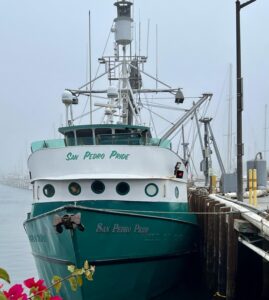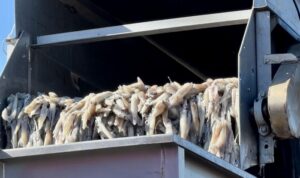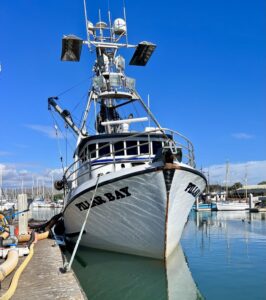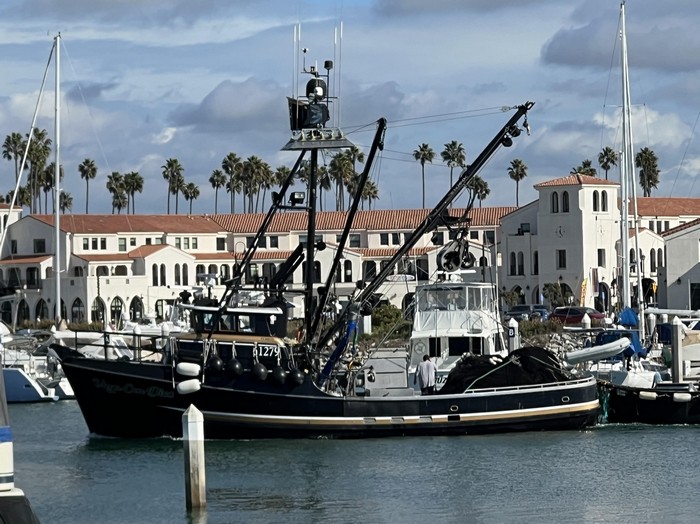Ventura has become a hub for squid fishing.
by Patricia Schallert
There are boats, and then there are the fishing boats in the Ventura Harbor that can’t be missed when strolling along the promenade in the Harbor Village. Ventura as a coastal town has a bustling squid industry that has long been a cornerstone of the Ventura economic and cultural community.
With its prime location along the central coast of California, Ventura has become a hub for squid fishing. The harbor continues to be the premier landing port for the California squid market.
 An interesting fact is that there are a total of 64 Squid Seiner Permits issued for all of California. Ventura Harbor Marina can accommodate 54 Squid Seiner Vessels at any given time. (“Seiner fishing is a method of fishing that uses a surrounding net, that hangs vertically in the water with its bottom edge held down with weights and top edge buoyed by floats.”) It has also been called “dragnet fishing”.
An interesting fact is that there are a total of 64 Squid Seiner Permits issued for all of California. Ventura Harbor Marina can accommodate 54 Squid Seiner Vessels at any given time. (“Seiner fishing is a method of fishing that uses a surrounding net, that hangs vertically in the water with its bottom edge held down with weights and top edge buoyed by floats.”) It has also been called “dragnet fishing”.
In 2022, the squid catch in Ventura was roughly 36,164,420 pounds or 19582.21 short tons. “680 tons of squid were brought into the Ventura Harbor during the last three weeks.” Captain Vic from Pillar Bay stated.
There is no other single marina on the west coast south of Alaska that can accommodate as many seiners fishing boats at one time as Ventura Harbor. It is currently a permanent home to 44 squid seiners with a total of 103 wet slips and 88 dry storage spaces.
Fishermen are attracted to the Ventura coast from as far away as Alaska and Nova Scotia in pursuit of the squid delicacy. These fishermen are equipped with specialized boats and fishing gear as they venture into the water searching for the elusive squid. (Scientific name: cephalopod).
Using powerful lights to attract squid to the surface, the fisherman carefully lower their nets and with precise movements, they haul in their catch, being careful not to damage the delicate squid.
 Their expertise in handling these creatures ensures that the squid are brought aboard unharmed and of the highest quality. Once the squid are safely on board, the boats return to the harbor, where the hustle of the squid industry comes to life.
Their expertise in handling these creatures ensures that the squid are brought aboard unharmed and of the highest quality. Once the squid are safely on board, the boats return to the harbor, where the hustle of the squid industry comes to life.
The industry has become a way of life, woven into the fabric of Ventura’s identity with residents, restauranteurs, and our many visitors.
In California, the Fish and Game Commission works with the California Department of Fish and Wildlife to actively manage the fishing guidelines and to ensure there is not overfishing or environmental impacts to the ocean.
There are seasonal catch limits, and programs that are designed to evaluate the impact of the fishing on ocean resources. Time and season closure, including weekend closure provides period of uninterrupted spawning, along with limitations on using lights to attract squid around several of the Channel Islands to protect nesting seabirds.
In 2022, commercial landings of market squid totaled 147 million pounds and were valued at $88 million, according to the NOAA Fisheries.
2022 36,164,420 lbs. 18,082 tons 28% of CA total catch
 CA catch roughly spread across: Northern CA/Monterey, Ventura, Port Hueneme, San Pedro.
CA catch roughly spread across: Northern CA/Monterey, Ventura, Port Hueneme, San Pedro.
Packaging plants located in Oxnard, Port Hueneme and Wilmington, near the Long Beach harbor play a crucial role in the squid industry. These plants ensure that the squid is processed and packaged efficiently for distribution to consumers worldwide. Cleaned squid is sorted based on weight and size before being cooked or frozen, depending on market demands. Quick freezing techniques are used to maintain freshness during transportation.
These packing plants also contribute significantly towards sustainability efforts by minimizing waste through responsible disposal practices.
After being packaged, squid products have various destination depending on the market. One common route are the overseas markets where the packaged squid is exported to different countries around the world. Both Japan and China high demands for California squid, caught along the Ventura coast is significant as they import large quantities of squid due to their domestic consumption needs.
The cost of packaged squid being returned to the United States can vary depending on quality, weight, distance traveled, shipping methods and applicable fees or taxes. Furthermore, there may be import duties or custom fees imposed by the US authorities. The proximity of the West coast of the United States to these Asian markets makes it convenient to export and import California squid also known as “Calamari”.

